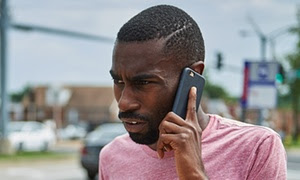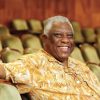
Deray McKesson has been one of the most vocal activists since the Ferguson shooting of 18-year-old Michael Brown in August 2014. Photograph: Michael B Thomas/AFP/Getty Images
Prominent Black Lives Matter activist Deray McKesson announced on Wednesday night that he will run for mayor of Baltimore, a move that could shake up both the movement and the city’s politics.
But McKesson’s campaign may also change the Black Lives Matter movement because Johnetta Elzie, another movement leader, is moving to Baltimore to help with McKesson’s campaign.
“There’s a way to challenge from the outside and a way to challenge from the inside and both are important,” McKesson said.
“Baltimore is a city of possibility and we’ve got to challenge the traditional pathways of politics and politicians who lay those paths. We have an opportunity, fundamentally for Baltimore that could change the city to be more transparent and accountable towards people.”
After rising to prominence during the protests over the death of Michael Brown in Ferguson, Missouri, in 2014, McKesson has spent much of the last year traveling from protest to protest.
Last summer, after the massacre of nine African Americans at the Mother Emmanuel church in Charleston, the hashtag #gohomederay began to circulate online.
Eventually – though not because of his critics, he insists – McKesson did go home, to Baltimore, where he had formerly worked as an administrator in the city’s public school system.
McKesson, who attended college at Bowdoin, where he says he “did everything”, said he does not try to trade on the poverty he experienced growing up in Baltimore, though he jokes about having to lie down on the floor when the family would hear gunshots.
McKesson’s father, Calvin McKesson, said: “I raised two kids by myself, both my kids went to college, both of them graduated, and neither came back home after they went to college. It don’t get no better than that. I’ll always be over the moon about being a dad”.
“This has been his lifelong dream since he was nine years old he wanted to be mayor of Baltimore. It is truly coming to fruition.”
Deray McKesson likens the democratic process to the development of Campaign Zero, the “data-informed platform [which] presents comprehensive solutions to end police violence in America” by integrating “community demands and policy recommendations from research organizations and the president’s taskforce on 21st-century policing”.
With the ongoing trials of the officers charged in the death of Freddie Gray and the police department under investigation by the Department of Justice, Baltimore is at the center of the debate about policing in America.
The current mayor, Stephanie Rawlings-Blake, announced that she would not seek re-election, shortly after she fired Anthony Batts, who had been the police commissioner during the protests that followed Gray’s death in April.
This opened the field to more than a dozen candidates, including Nick Mosby, the husband of Marilyn Mosby, the charismatic prosecutor who indicted the officers involved in Gray’s death; and Sheila Dixon, a former mayor who was forced to resign as part of a plea deal in a criminal case in 2010.
But the decision wasn’t automatic. In discussions with the Guardian over the last two months, he has gone back and forth on the move several times as he met with trusted advisers and put together a team.
D Watkins, a local writer and columnist for Salon.com, was one of the people McKesson reached out to. “Some of the candidates I spoke to they don’t have anything – they don’t have plans, ambition and a hunger to make things better. They want to be mayor just because,” he said.
“His ideas are good. He’s smart. When it comes to strategy and planning he’s smarter than those guys. I understand why he is where he’s at because he knows more.”
Jill Carter, a state delegate representing Baltimore whom many progressives hoped would run, is not so positive, calling the run “ridiculous”.
“He has no authenticity and no base other than Twitter followers,” she said. “I’m a little worried that his decision is another self serving scheme that will further divide our justice movement.”














